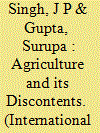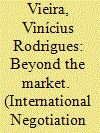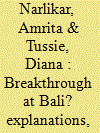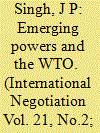| Srl | Item |
| 1 |
ID:
146456


|
|
|
|
|
| Summary/Abstract |
The demise of the Doha round of trade negotiations is often attributed to deadlocks in agricultural negotiations between the developed and the developing world. Why has agriculture been so difficult to negotiate? This article explains North-South agricultural negotiations through the lens of coalition politics, especially the shift from bloc to issue-based diplomacy from the developing world. We argue against the proposition in the negotiation literature that multiple coalitions at the international level allow negotiators room to maneuver. Our study shows that bloc coalitions in fact allowed for compromise more than issue-based coalitions in agriculture, which are often supported by strong domestic constituencies. Empirically, the article focuses on the Uruguay Round when the North and South struck an agreement on agriculture and the Doha Round, which remains deadlocked. The article also provides an in-depth case study of India’s agricultural interests and its food security program in the context of the WTO.
|
|
|
|
|
|
|
|
|
|
|
|
|
|
|
|
| 2 |
ID:
146455


|
|
|
|
|
| Summary/Abstract |
Negotiators expect the World Trade Organization (WTO) to be an arena for states to pursue their material gain. However, the WTO also reflects symbolic aspects of international politics, in particular the notion of multilateralism. Although such a principle, in part, expresses Western dominance, Global South states have also benefited from multilateral regimes, and thus have incentives to legitimize them and behave according to their rules. Will the pattern of multilateralism change as other trade arrangements potentially gain more prominence? This article analyzes actions taken by Brazil and India in WTO’s Doha Development Agenda (DDA) and concludes that the multilateral system of trade will survive as Global South states participate in the organization to seek not just material gains but also to commit themselves to the international normative dimension.
|
|
|
|
|
|
|
|
|
|
|
|
|
|
|
|
| 3 |
ID:
146453


|
|
|
|
|
| Summary/Abstract |
The World Trade Organization’s (WTO) Ministerial Conference at Bali in December 2013 seemed to have marked a landmark moment in the history of the negotiations of the Doha Development Agenda (DDA). This article begins with a brief analysis of why the DDA has been quagmired in deadlocks and become the longest running trade round in the history of the multilateral trading system. It then discusses the significance of what was achieved at the Bali Ministerial in light of repeated failures and particularly from the perspective of the world’s poorest countries. It explains why and how breakthroughs were achieved and highlights several important institutional innovations. Lastly, it discusses how sustainable these innovations might be.
|
|
|
|
|
|
|
|
|
|
|
|
|
|
|
|
| 4 |
ID:
146452


|
|
|
|
|
| Summary/Abstract |
International trade has become increasingly important to emerging market economies. Concurrently, increasing trade liberalization through the multilateral Doha Round, launched in November 2001, from the World Trade Organization (WTO) has been a failure. The essays in this issue evaluate the role of Brazil, China, and India at the WTO examining in particular their domestic and coalitional constraints, the fairness and justice claims underlying their interests, and the types of identity politics that inform their negotiation positions. These three facets do not make multilateral negotiations easy but they do offer possibilities for future negotiations. Multilateral trade negotiations may not decline but the current era of ‘managed multilateralism’ has become complex balancing great and emerging powers interests.
|
|
|
|
|
|
|
|
|
|
|
|
|
|
|
|
| 5 |
ID:
146457


|
|
|
|
|
| Summary/Abstract |
This concluding article argues that while the actions of emerging powers have left an indelible mark on the way multilateral trade is governed, they have not been able to disrupt to any significant degree the deeper structures of power that underpin the World Trade Organization (WTO). While emerging powers have proven to be important players in the Doha negotiations, particularly in the closing stages, they have ultimately come up against a glass ceiling that prevents their further rise. This ceiling is the product of a series of institutional factors that combine to facilitate alterations in the general arrangement of members one-to-another but which prevent deeper configurations of power from being disturbed. The result is that while we may have witnessed some changes in the multilateral trading system, these have been more akin to a rearrangement of the multilateral furniture than to a fundamental transformation of the system.
|
|
|
|
|
|
|
|
|
|
|
|
|
|
|
|
| 6 |
ID:
146454


|
|
|
|
|
| Summary/Abstract |
As the WTO’s Dispute Settlement Body (DSB) gains relevance as a rule-maker in trade governance, understanding the reform negotiations addressing its legal framework becomes increasingly important. This article examines how domestic ideas and interests affect the reform positions of two of the DSB’s most active users, emerging power states Brazil and India. Regarding domestic interests, I draw on the domestic politics and two-level games literatures to argue that the amount and favorability of domestic sectors’ experience with the DSB affects their incentives to lobby during the reform negotiations. Interestingly, this results in countries pursuing liberal interests within negotiations, despite having conflicting domestic interest preferences overall. Regarding domestic ideas, I find evidence that Brazilian and Indian politicians feel accountable to voters in the negotiations, contradicting claims to the contrary in the literature. This highlights the need for more research illustrating links between voters and officials in this context.
|
|
|
|
|
|
|
|
|
|
|
|
|
|
|
|